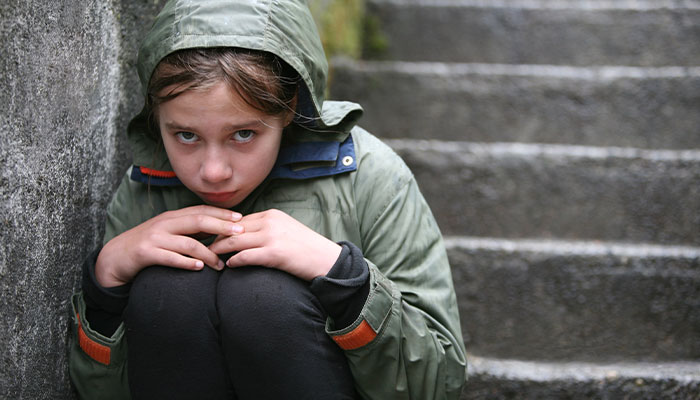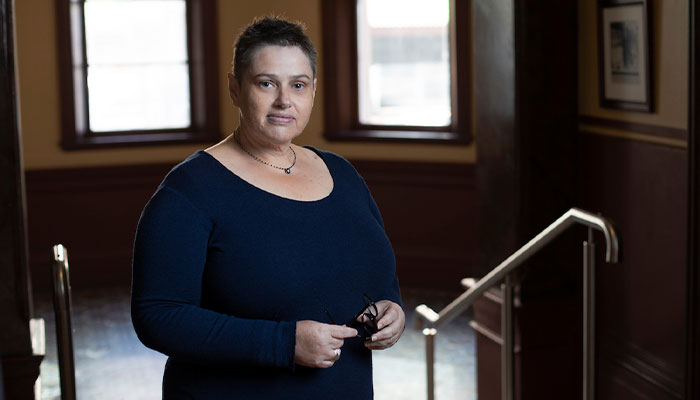Homelessness in Australia is primarily a result of poverty and lack of affordable housing, rather than mental health or substance abuse issues that the homeless are often stereotyped with, new Macquarie research has found.

Long-term impacts: Children in homeless families may experience challenging, even traumatic experiences that can have adverse outcomes throughout their adult life.
It is a situation exacerbated by COVID-19 as lockdowns and job losses increased the homelessness risk for families.
And the risk has risen yet again with the end of eviction restrictions, mortgage deferral schemes and JobKeeper, and the return of JobSeeker to levels only slightly higher than pre-pandemic, our study shows.
These are the kinds of shocks that will result in more families losing their homes. Concern in the welfare sector that the number of homeless Australians will now leap is supported by the results of our study, which concludes that an increase in income support and investment in social housing are vital to protecting poor families when their housing security is challenged.
Children in homeless families may experience challenging, even traumatic experiences linked to sustained poverty and insecurity.
Our findings are the result of fresh analysis of data from the Journeys Home project which followed 1650 Centrelink clients at risk of homelessness between 2011 and 2014.
We found homelessness for families in poverty occurs when a crisis, such as domestic violence, job loss or eviction, illness or relationship breakdown, challenges their housing security and they do not have the resources to meet it.
We also found that the range and quantity of resources that a family in crisis can mobilise will depend to some extent on their personal story, for example, their work and unemployment history, education levels, the presence of health issues and the level of poverty in their family and friend network.
But while individual stories are diverse, the fundamental reason for homelessness is that, at a time of crisis, some families do not have adequate funds, access to sufficient help from friends or family, or are not able to find affordable housing.
Children are suffering
In Australia, our study found there are two main factors that exacerbate the threat of homelessness.
First, low rates of government income support keeping families in poverty, so they do not have enough money to get them through an emergency. Second, the colossal lack of adequate social housing available to families on low incomes, leaving them to struggle in the unaffordable private rental market.
Welfare services have reported a significant increase in domestic violence. Mental health services and food banks have also experienced increased demand.
Children in homeless families may experience challenging, even traumatic experiences linked to sustained poverty and insecurity. These events in childhood can have long-reaching adverse outcomes throughout their adult life. In the context of how inequality and disadvantage are transferred to the next generation: housing matters.
Counting the number of families experiencing homelessness is difficult as homelessness is often hidden. Using Census data, the ABS estimates that on 2016 Census night, 15,861 children under the age of 12 were homeless. The majority were living in severely overcrowded accommodation, but two in five were 'couch surfing' (staying temporarily with other households), living in crisis accommodation, or 'sleeping rough' in tents or on the street (456 children).
And then came COVID-19
As a result of the increased financial pressure on families due to Covid-19, through job losses and reduced working hours, welfare services have reported a significant increase in domestic violence. Mental health services as well as food banks have also experienced increased demand.

Policy call: Catherine Hastings (pictured) says families on income support payments are again needing to survive on incomes far below the poverty level.
The Commonwealth's JobKeeper and JobSeeker, as well as the state-based restrictions on tenant evictions at the start of the pandemic, are credited with preventing an immediate homelessness crisis. The temporary $550 per fortnight Covid-19 supplement improved the lives of low-income families, enabling them to pay off debt and live with less financial stress.
Although unemployment rates have fallen, they are still higher than before the pandemic and full-time jobs have been slower to return.
Families on income support payments are again needing to survive on incomes far below the poverty-level, and there is still a lack of social housing for families who struggle to afford a private rental.
Without housing security, looking for work is almost impossible. A permanent increase to the JobSeeker rate, and an increased investment in public housing instead of continually increasing the spending on crisis accommodation, would assist low-income families to manage their homelessness risk.
Catherine Hastings is an Adjunct Fellow in the Department of Sociology at Macquarie University.






